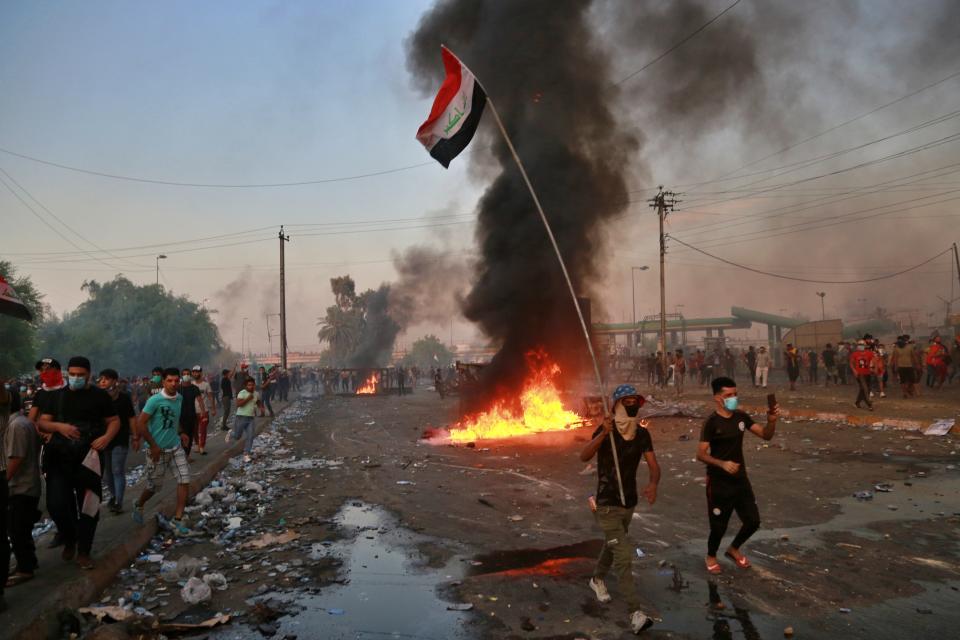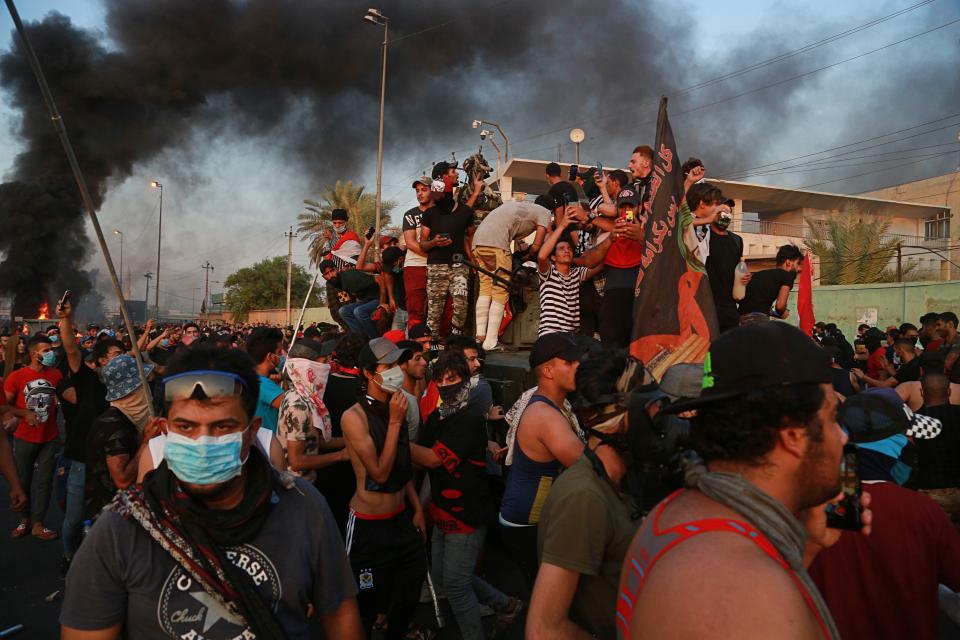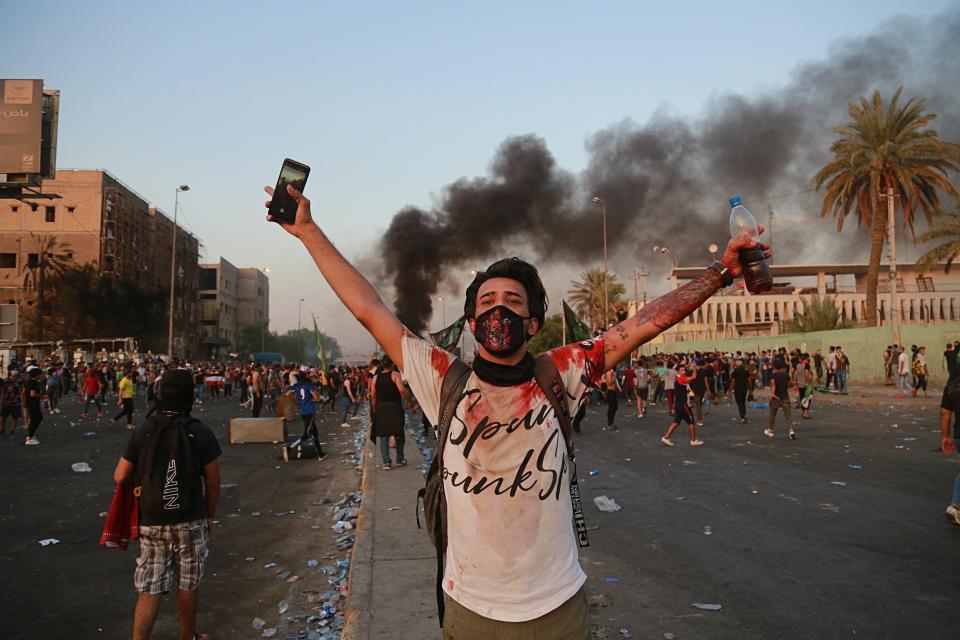The Latest: Iraq Parliament speaker says he supports demands
BAGHDAD (AP) — The Latest on developments in Iraq, amid deadly violence over anti-government protests (all times local):
10:35 p.m.
An influential Iraqi Shiite cleric has called on the government to resign and early elections be held to bring the country out of a crisis that has left more than 50 dead in four days.
Muqtada al-Sadr issued a statement Friday night saying that shedding the blood of "Iraqis cannot be ignored."
Earlier in the day, al-Sadr's Sairoon political bloc in parliament that came in first in last year's national elections said it was suspending participation in parliamentary activities until the government introduces a program that serves Iraqi aspirations.
Since the spontaneous rallies began Tuesday, security forces have fired live rounds and tear gas every day to disperse them in multiple provinces.
The demonstrators are demanding jobs, improved services like electricity and water, and an end to corruption in the oil-rich country.
__
9:25 p.m.
Iraq's Parliament Speaker Mohammed al-Halbusi says he supports the demands of protesters, adding that the legislature will work on fighting corruption that is "as dangerous as terrorism."
Al-Halbusi said four days of protests "are an important lesson" to Iraqi officials calling for an investigation into attacks on protesters.
He promised the state will soon begin building apartments for the poor.
The official called on protesters to stand by the Iraqi state in chasing those "who robbed the money of the people." He added that protesters should not attack state institutions since the property is for the people.
Al-Halbusi said Iraqis should fight corruption "the way we fought terrorism." He was referring to the fight against the Islamic State group that was officially defeated in Iraq in 2017.
___
9:10 p.m.
The U.N. envoy for Iraq is welcoming Prime Minister Adil Abdul-Mahdi's call for unity, dialogue and action.
U.N. spokesman Stephane Dujarric told reporters Friday that Jeanine Hennis-Plasschaert said "there is an opportunity to move forward and that the interests of the country must be prioritized above all else."
Mostly young demonstrators are demanding jobs, improved services like electricity and water, and an end to corruption in the oil-rich country.
Dujarric quoted Hennis-Plasschaert as saying that "dialogue must pave the way to understanding, reconciliation and progress."
Meanwhile, the Geneva-based U.N. human rights office called on the Iraqi government Friday to allow people to freely exercise their rights to freedom of expression and peaceful assembly, Dujarric said.
The Office of the High Commissioner for Human Rights said the use of force "should be exceptional," and comply with international rights standards including "necessity and proportionality," according to Dujarric.
___
7:20 p.m.
Iraqi medical and security officials say 10 more protesters have been killed in the capital Baghdad, raising the death toll in four days of protests to 53.
The officials said nine people were killed Friday afternoon in Baghdad's central area of Gailani, near Tahrir Square where the protests in the capital have been concentrated.
The officials, who spoke on condition of anonymity in line with regulations, added that one person was also killed in Baghdad's southern neighborhood of Zaafaraniya.
The figure raises to 11 the number of people killed in Baghdad Friday.
The protests that began on Tuesday in Baghdad have spread to predominantly Shiite southern provinces.
The spontaneous rallies have been spurred mostly by youths wanting jobs, improved services such as electricity and water, and an end to corruption.
— By Qassim Abdul-Zahra.
___
3:45 p.m.
An influential Iraqi Shiite cleric whose political coalition came in first in last year's national elections says he's suspending participation in parliament activities until the government introduces a program that serves Iraqi aspirations.
Muqtada al-Sadr has asked members of his parliament bloc to boycott sessions until the government issues a program acceptable to the people.
Al-Sadr's Sairoon electoral list won the largest single bloc of seats in parliament elections last year. The bloc has 54 seats in the 329-member parliament.
The move comes after Iraq's top Shiite authority, Grand Ayatollah Ali al-Sistani, blamed lawmakers for failing to enact reforms and eradicate corruption.
___
3:30 p.m.
Three Gulf Arab nations have advised their citizens to avoid traveling to Iraq and those who are there to leave the country immediately.
Friday's call by Kuwait, Qatar and Bahrain comes after three days of protests in Iraq that have left 42 people dead.
The Kuwaiti news agency Kuna cited a Foreign Ministry official as urging Kuwaiti nationals to avoid traveling to Iraq due to the demonstrations, and for those already there to leave as soon as possible, and to avoid areas where protests are held.
Qatar's Foreign Ministry issued a similar request.
Bahrain's Foreign Ministry also called on its country's citizens not to travel to Iraq and urged those already in Iraq to "leave immediately."
___
3:15 p.m.
Iraqi security forces have again opened fire on protesters gathered in central Baghdad, wounding one person on the fourth day of violence amid anti-government rallies.
The protesters were gathered in a street behind Tayaran Square on Friday, chanting slogans when security forces opened fire. A young man was shot in the leg.
It was the first shooting after Iraq's top Shiite cleric, Grand Ayatollah Ali al-Sistani, earlier in the day called on both sides to cease violence, which has gripped Iraq since Tuesday.
Many across Iraq's predominantly Shiite south had looked to the influential cleric for guidance.
___
1:15 p.m.
Iraq's most influential Shiite cleric has called for an end to the violence gripping the country, urging both sides to pull back "before it is too late."
The comments by Grand Ayatollah Ali al-Sistani were his first since anti-government protests began earlier this week. The violence has killed 42 people so far.
He also criticized the government, as well as the leaders of the two biggest parliament blocs, saying they failed to fulfill their promises to the people.
Al-Sistani called on political leaders to take "practical and clear steps" toward combatting corruption and on the government to "carry out its duty" to diminish people's suffering.
He reiterated his suggestion for a committee of technocrats tasked with making recommendations on fighting corruption, as a way out of the current crisis.
Al-Sistani's message was delivered on Friday by his representative Ahmed al-Safi in the Shiite holy city of Karbala.
___
12:30 p.m.
Iraqi officials are reporting nine more deaths in anti-government protests in a southern city, bringing this week's overall death toll to 42.
Hospital officials say the deaths occurred late Thursday in Nasiriyah, which has witnessed the most violence in the protests, with at least 25 people, including a policeman, killed. The city is about 320 kilometers, or 200 miles, southeast of Baghdad.
The officials spoke to The Associated Press on condition of anonymity in line with regulations.
Since Tuesday, security forces have fired live rounds and tear gas every day to disperse protesters demanding job opportunities, improved services and an end to corruption.
Iraq's Prime Minister Adel Abdul-Mahdi who hails from Nasiriyah, has urged calm, saying he's working to meet protesters legitimate demands but adding that there's no magic solution for Iraq's problems.
—Qassim Abdul-Zahra in Baghdad;
___
8:35 a.m.
Iraq's prime minister has addressed the nation over the turmoil gripping the country, calling on protesters to go home and saying their demands have been heard.
Prime Minister Adel Abdul-Mahdi says that the security measures imposed in the wake of this week's violence, including the temporary curfew, are "difficult choices" but are needed like "bitter medicine" that has to be swallowed.
Iraqi security forces have imposed a round-the-clock curfew in Baghdad. Since Tuesday, they fired live rounds and tear gas every day to disperse anti-government protests, leaving 33 people dead and wounding hundreds.
The prime minister's speech was televised early on Friday.
He told protesters their "legitimate" demands in countering corruption and providing jobs have been heard and that it's "important to help the government perform its duty toward you."




